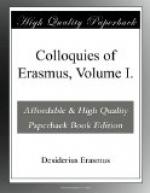That both of them had an equal Aversion to austere, sullen, designing Knaves, of what Complexion, Magnitude, or Party soever. That both of them were Men of Wit and Satyr, but that Erasmus, according to the Genius of his Country, had more of the Humourist in him than Lucian, and in all Parts of Learning was infinitely his Superior. That Lucian liv’d in an Age, when Fiction and Fable had usurp’d the Name of Religion, and Morality was debauch’d by a Set of sowr Scoundrels, Men of Beard and Grimace, but scandalously lewd and ignorant, who yet had the Impudence to preach up Virtue, and stile themselves Philosophers, perpetually clashing with one another about the Precedence of their several Founders, the Merits of their different Sects, and if it is possible, about Trifles of less Importance; yet all agreeing in a different Way, to dupe and amuse the poor People by the fantastick Singularity of their Habits, the unintelligible Jargon of their Schools, and their Pretentions to a severe and mortified Life. This motly Herd of Jugglers Lucian in a great Measure help’d to chase out of the World, by exposing them in their proper Colours.
But in a few Generations after him, a new Generation sprung up in the World, well known by the Name of Monks and Friars, differing from the former in Religion, Garb, and a few other Circumstances, but in the main, the same individual Imposters; the same everlasting Cobweb-Spinners as to their nonsensical Controversies, the same abandon’d Rakehells as to their Morals; but as for the mysterious Arts of heaping up Wealth, and picking the Peoples Pockets, as much superior to their Predecessors the Pagan Philosophers, as an overgrown Favourite that cheats a whole Kingdom, is to a common Malefactor.
These were the sanctified Cheats, whose Follies and Vices Erasmus has so effectually lash’d, that some Countries have entirely turn’d these Drones out of their Cells, and in other Places where they are still kept, they are grown contemptible to the highest Degree, and oblig’d to be always upon their Guard.
THE
Familiar Colloquies
OF
DESIDERIUS ERASMUS,
OF
ROTERDAM.
* * * * *
The ARGUMENT.
This Colloquy teaches
Courtesy and Civility in Saluting,
who, when, and by what
Title we ought to Salute.
At the First Meeting.
A Certain Person teaches, and not without Reason, that we should Salute freely. For a courteous and kind Salutation oftentimes engages Friendship, and reconciles Persons at Variance, and does undoubtedly nourish and increase a mutual Benevolence. There are indeed some Persons that are such Churls, and of so clownish a Disposition, that if you salute them, they will scarcely salute you again. But this Vice is in some Persons rather the Effect of their Education, than their natural Disposition.




